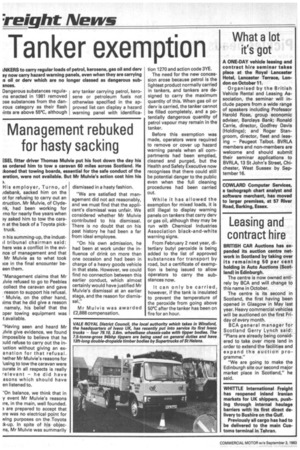Management rebuked for hasty sacking
Page 12

If you've noticed an error in this article please click here to report it so we can fix it.
ESEL fitter driver Thomas Mulvie put his foot down the day his ss ordered him to tow a caravan 60 miles across Scotland. He :koned that towing boards, essential for the safe conduct of the eration, were not available. But Mr Mulvie's action cost him his His employer, Turno, of fdebank, sacked him on the ot for refusing to carry out an ;truction. Mr Mulvie, of Clydenk, had been working for rno for nearly five years when ni asked him to tow the caran at the back of a Toyota picktruck.
n his summing-up, the IndustII tribunal chairman said: here was a conflict in the evince of management and that Mr Mulvie as to what took ice in the final encounter beeen them.
'Management claims that Mr ilvie refused to go to Peebles collect the caravan and gave reason to support his refusal. Mulvie, on the other hand, iirns that he did give a reason namely, his belief that the per towing equipment was t available.
"Having seen and heard Mr JIvie give evidence, we found impossible to believe that he )uld refuse to carry out the inuction without giving an exanation for that refusal. hether Mr Mulvie's reasons for 'using to tow the caravan were curate in all respects is really ,elevant — he did have asons which should have en listened to.
'On balance, we think that in y event Mr Mulvie's reasons
in the main, well founded. 3 are prepared to accept that ;re was no electrical point for wing purposes on the Toyota ;k-up. In spite of his objecns, Mr Mulvie was summarily
dismissed in a hasty fashion.
"We are satisfied that management did not act reasonably, and we must find that the applicant's dismissal was unfair. We considered whether Mr Mulvie contributed to his dismissal. There is no doubt that on his past history he had been a far from ideal employee.
"On his own admission, he had been at work under the influence of drink on more than one occasion and had been in charge of a heavy goods vehicle in that state. However, we could find no connection between this earlier conduct, which almost certainly would have justified Mr Mulvie's dismissal at an earlier stage, and the reason for dismissal."
























































































































